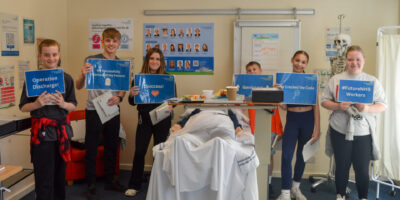The Siemens Edge scanner offers all the essential features and has advanced technology, including larger gantry dimensions to support bariatric scanning and software to support complex cardiac techniques. Additionally, the hospital has also taken delivery in the last few weeks of a new MRI scanner.
This project has also incorporated a scheme to improve the environment for patients undergoing scans. Keane Creative were commissioned to undertake bespoke artwork to help aide patient distraction and enhance the environment using art and design in the inpatient waiting area and scan room. Patients can at times be on a CT scanner for up to thirty minutes for some procedures and it’s important they are as relaxed as possible.
Sara Elliott, Head of Radiology at Doncaster and Bassetlaw Teaching Hospitals (DBTH), said, “We have been delighted to take delivery of a new CT scanner and MRI unit at Bassetlaw Hospital in March, both of which will help us to provide the best possible care to our patients. The new units will help us to enhance and improve local radiology for the over 18,000 patients who use this service each and every year.
“We also want to thank Keane Creative who have been commissioned by DBTH Charity to create bespoke artwork within the CT Suite. A CT scan can sometimes take up to 30 minutes, and this wonderful wall art helps to create an interesting, stimulating and comforting distraction for patients while they undergo their procedure. This addition has only been made possible by the kind donations sent to the hospital by our local communities, businesses and organisations.”
A CT scan uses X-rays and a computer to create detailed images of the inside of the body. The scans are carried out by specially-trained operators called radiographers and are crucial for diagnosis, guiding further tests or treatments, and are instrumental in diagnosing and monitoring conditions such as cancer.



